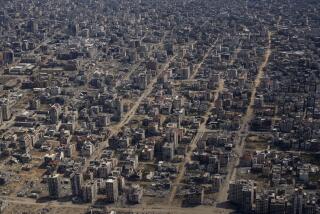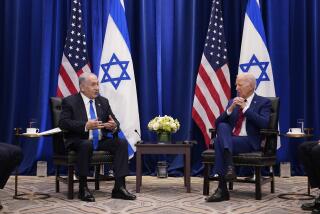U.S. Introduces ‘Working Document’ to Propel Israeli-Syrian Peace Talks
SHEPHERDSTOWN, W.Va. — Israeli Prime Minister Ehud Barak and Syrian Foreign Minister Farouk Shareh held face-to-face talks Friday for only the second time as the fifth day of the Middle East peace talks plodded toward an inconclusive end.
President Clinton, who met alone with Barak and Shareh for about 40 minutes, handed them a U.S.-drafted document outlining issues on which the antagonists appear to agree and summarizing the more significant list of disagreements, U.S. officials said.
The purpose of the U.S. analysis is to “focus the discussion” for the rest of this round of talks--which probably will end early next week--and for the rounds that are expected to follow, State Department spokesman James P. Rubin said.
“There is a fair amount of common ground . . . but the remaining areas are big differences, [and] they are emotional differences,” Rubin said.
Before their meeting, Clinton, Barak and Shareh met for about half an hour with their top aides. On top of a similar three-way meeting Tuesday, the Friday sessions increased to just 2 1/2 hours the time that the two men have spent together in formal discussions.
“This is not warm and fuzzy, but it is businesslike and professional,” Rubin said in describing the relationship between the Israeli and the Syrian.
He said the Barak-Shareh meeting was a “wide-ranging political discussion” in which each leader made clear what he will insist any agreement must include.
For most of the rest of the conference in this West Virginia college town, Israel and Syria have exchanged views only through the U.S. mediators.
The negotiators worked a short day Friday, ending before the start of the Jewish Sabbath at sundown. But Rubin said contacts are expected to resume after the Sabbath ends at sundown tonight and will continue through the day Sunday. The Muslim month of Ramadan ends today.
After Sunday, Rubin said, the three delegations will assess their progress and decide what to do next. One possibility, he said, is for Barak and Shareh to go home, leaving lower-level officials to continue talks, either in Shepherdstown or somewhere else.
Officials said this round could end as early as Monday but that it could go a day or two longer.
“We have very limited expectations of what can be achieved in one round,” Rubin said.
Despite the uncertain outcome, officials said the Shepherdstown conference was significant. It was the first full-scale negotiation between Israel and Syria in almost four years.
U.S. officials said the break between rounds will give each country a chance to assess the first-round results and prepare for another set of meetings later this year.
Rubin said the U.S.-drafted “working document” outlines the positions expressed by Israelis and Syrians at Shepherdstown and in earlier contacts.
He said the paper underlines some areas of agreement, but he emphasized that nothing can be considered final until everything has been agreed upon--and that is a long way down the road.
Meanwhile, a nationwide organization of Reform Jewish congregations announced plans to demonstrate Monday at the Israeli Embassy in Washington and at consulates in Los Angeles, New York, Philadelphia, Houston, Boston, Miami, San Francisco, Atlanta and Chicago in support of Barak’s peace initiative.
“We are mobilizing a campaign to demonstrate that the North American Reform movement strongly supports Prime Minister Barak and his government’s efforts to forge a comprehensive peace accord with Syria,” the Assn. of Reform Zionists of America, or ARZA, said in a written announcement.
A spokeswoman said the object was to counteract a demonstration this week in Shepherdstown by a group of Orthodox Jews accusing Barak of selling out Israel by considering a deal that would return the Golan Heights to Syria.
More to Read
Sign up for Essential California
The most important California stories and recommendations in your inbox every morning.
You may occasionally receive promotional content from the Los Angeles Times.










